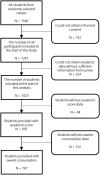The Consumption of Sweets and Academic Performance among Mongolian Children
- PMID: 33266218
- PMCID: PMC7729965
- DOI: 10.3390/ijerph17238912
The Consumption of Sweets and Academic Performance among Mongolian Children
Abstract
The regular consumption of sweets has been shown to have an adverse association with the academic performance of children in developed countries; however, the situation in developing countries is less clear. Therefore, we examined the association between the consumption of sweets and academic performance among Mongolian children via a cross-sectional study employing data from 787 children aged 8-16 from two public schools in Ulaanbaatar, the capital of Mongolia. The frequency of the consumption of sweets by the children was captured using a questionnaire and then linked to their academic scores; the association between the consumption of sweets and scores in mathematics and the Mongolian language was evaluated using multiple linear regression adjusted for other covariates. It was found that out of 787 students, 58.6% ate sweets every day. After adjusting for covariates, no significant association was observed between the consumption of sweets and mathematics scores (coefficient: 0.15; 95% confidence interval (CI): -0.02-0.32), while a higher consumption of sweets was significantly associated with higher scores in the Mongolian language (coefficient: 0.25; 95% CI: 0.09-0.41). The associations established in this study are inconsistent with the reports of other studies.
Keywords: Mongolia; academic score; nutrition.
Conflict of interest statement
The authors declare no conflict of interest.
Figures
Similar articles
-
The intake of fruit and sweets in rural and urban Greenland--development from 1994 to 2006.Int J Circumpolar Health. 2011 Apr;70(2):186-94. doi: 10.3402/ijch.v70i2.17808. Epub 2011 Apr 29. Int J Circumpolar Health. 2011. PMID: 21527069
-
The Apples of Academic Performance: Associations Between Dietary Patterns and Academic Performance in Australian Children.J Sch Health. 2018 Jun;88(6):444-452. doi: 10.1111/josh.12631. J Sch Health. 2018. PMID: 29749001
-
[Daily consumption of soft drinks, sweets and fried foods among adolescents in the northeast of Brazil].Cien Saude Colet. 2013 Dec;18(12):3739-50. doi: 10.1590/s1413-81232013001200030. Cien Saude Colet. 2013. PMID: 24263890 Portuguese.
-
Association Between Prenatal Valproate Exposure and Performance on Standardized Language and Mathematics Tests in School-aged Children.JAMA Neurol. 2018 Jun 1;75(6):663-671. doi: 10.1001/jamaneurol.2017.5035. JAMA Neurol. 2018. PMID: 29459981 Free PMC article.
-
[Simple obesity in children. A study on the role of nutritional factors].Med Wieku Rozwoj. 2006 Jan-Mar;10(1):3-191. Med Wieku Rozwoj. 2006. PMID: 16733288 Review. Polish.
Cited by
-
The Analysis of the Nutritional Status and Dietary Habits among Children Aged 6-10 Years Old Attending Primary Schools in Poland.Int J Environ Res Public Health. 2022 Jan 15;19(2):953. doi: 10.3390/ijerph19020953. Int J Environ Res Public Health. 2022. PMID: 35055774 Free PMC article.
-
Responsive feeding practices among Arabic and Mongolian speaking migrant mothers in Australia: A qualitative study.Matern Child Nutr. 2025 Jan;21(1):e13718. doi: 10.1111/mcn.13718. Epub 2024 Sep 2. Matern Child Nutr. 2025. PMID: 39223741 Free PMC article.
-
Effects of Lockdown for COVID-19 Pandemic on Chronic Kidney Disease Progression in Children with Congenital Anomalies of the Kidney and Urinary Tract: A Retrospective Pilot Study.Children (Basel). 2023 Jan 6;10(1):123. doi: 10.3390/children10010123. Children (Basel). 2023. PMID: 36670673 Free PMC article.
-
Clustering of 24-H Movement Behaviours and Its Associations With Eating Behaviours and Adiposity Among Mongolian Preschool Children: A Cross-Sectional Study.Child Care Health Dev. 2025 May;51(3):e70084. doi: 10.1111/cch.70084. Child Care Health Dev. 2025. PMID: 40238925 Free PMC article.
-
Association between Smoking during Pregnancy and Short Root Anomaly in Offspring.Int J Environ Res Public Health. 2021 Nov 6;18(21):11662. doi: 10.3390/ijerph182111662. Int J Environ Res Public Health. 2021. PMID: 34770175 Free PMC article.
References
-
- Ickovics J.R., Carroll-Scott A., Peters S.M., Schwartz M., Gilstad-Hayden K., McCaslin C. Health and academic achievement: Cumulative effects of health assets on standardized test scores among urban youth in the United States. J. Sch. Health. 2014;84:40–48. doi: 10.1111/josh.12117. - DOI - PMC - PubMed
Publication types
MeSH terms
LinkOut - more resources
Full Text Sources
Research Materials


